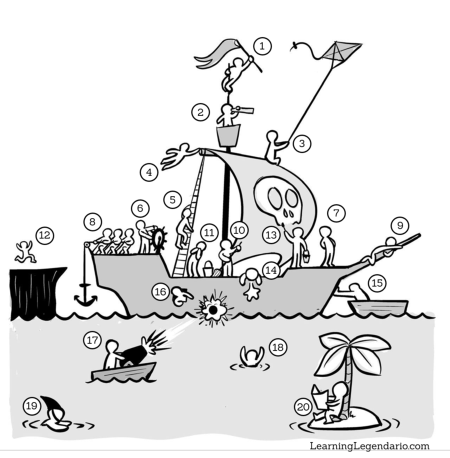Individual students
If you supervise students for their thesis (BSc., MSc. or PhD) and the student delivers the quality within the set time, be happy and enjoy. But.... of course, it's possible that the student doesn't deliver on time, the quality is too low etc. What do you do?
First, to find out what is causing the student's behaviour. There may be several reasons.
- Personal issues: If students have personal problems, refer them to the study advisor. The study advisor has the time and expertise to help the student.
- Thesis related issues:
- If the student has difficulty writing, refer the student to the Writing Centre.
- If the student struggles to understand the topic, find out what the student understands and where they are going wrong. Then, slow down, take smaller steps, and give the student extra support to understand the topic, e.g., by giving an article, explanation, etc.
- If the student doesn't get your feedback/ explanation, try a different supervision style. In UTQ we use the Hersey and Blanchard model. This model asks you to identify whether the student is ready (or not) to do the assignment and combine this with whether the student is able (or not) to do the assignment. You have four supervising styles:
Student A: Is unable but willing --> high directive and low supportive behaviour of the supervisor
Student B: Is unable and unwilling --> high directive and high supportive behaviour of the supervisor
Student C: Is able but unwilling --> low directive and high supportive behaviour of the supervisor
Student D: Is able and willing --> low directive and low supportive behaviour of the supervisor
Group dynamics
Group dynamics is the social process by which people interact and behave in a group environment. Each person in the group has a role. Some people are leaders and others are followers. In our educational system at UT, working in (project) groups plays a major role.
We will explain:
- Different team roles in the group, according to the theory of Belbin
- Different stages in the group process
- Some examples to help groups (and yourself) get an insight into what goes on in a group.
Belbin's research showed that a successful team is made up of a mix of behaviours. If you don't have the right mix, the group may not function optimally. Belbin defines 9 roles, namely:
Social roles:
- Resource Investigator
- Teamworker
- Co-ordinator
Thinking roles:
- Plant
- Monitor Evaluator
- Specialist
Action or Task roles:
- Shaper
- Implementer
- Completer Finisher
Stages of group development If you put a group of students together and ask them to work on a task or project, the group will develop over time. Tuckman discovered that the group goes through 5 stages:
- Forming: The group is put together (by the teacher or by their own choice), it is important that they get to know each other. To move on to the next stage, all members of the group need to feel safe.
- Storming: The group starts to have a look at the project/task/assignment and some of them start to give their opinion, conflicts may arise about the product or the process. These 'conflicts' can go on forever, so it is up to the group (or the teacher) to move them on to the next stage.
- Norming: In this stage, the group (with the help of the teacher) starts to make agreements. It is advisable to write down the commitments and tasks.
- Performing: In this fourth stage, the work is done, the group knows what to do and how to handle the situation.
- Adjourning: When the project/task/assignment ends, make sure you have a moment to break up the group, e.g. with a presentation, last group meeting.
1. Belbin test and insight into the different roles represented in the group.
Gain insight into the representation of different roles in the group. Look for a short Belbin test on the internet and ask each student to fill in the questions. Discuss the results and look at the different roles, are all the Belbin roles represented? If not, which role is missing? Can anyone take that role?
2. What stage is the group at?
Sometimes group members come to you as a teacher and mention that 'things aren't working' in the group. Ask questions about what is going on in the group and what they need. Or you can sit with the group when they are meeting and observe what is going on. In most situations where things don't work, the group is still in the 'storming' stage and they need to define roles and tasks in a clear way.
3. Evaluate (in the meantime)
In a group there are different people involved with their own ideas and roles. The theories of Belbin and Tuckman can be helpful, but sometimes the 'pirate ship exercise' provides more insight. Ask each person in the group to look at the picture of the pirate ship and identify who they know in the group and have a discussion about roles and attitudes.

Last edit: 29 November 2024
